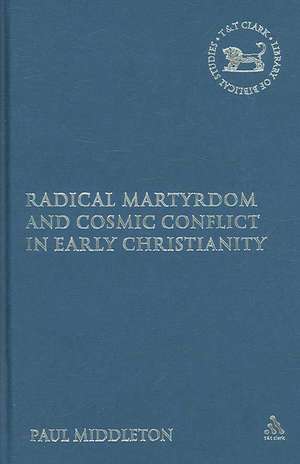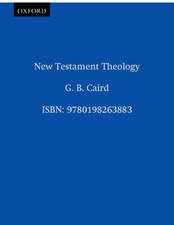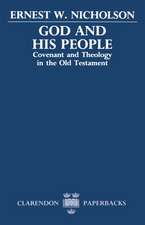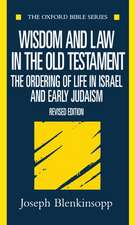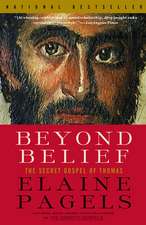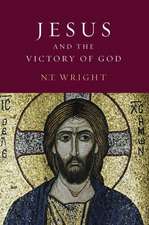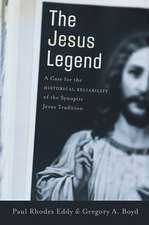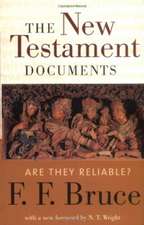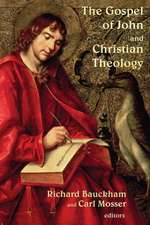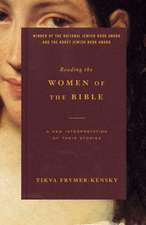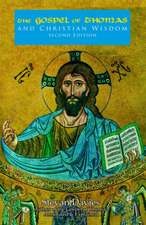Radical Martyrdom and Cosmic Conflict in Early Christianity: The Library of New Testament Studies
Autor Dr Paul Middletonen Limba Engleză Hardback – 29 iun 2006
Several view of martyrdom co-existed in the early Church. The 'orthodox' position, generally accepted by scholars, was that a Christian should choose martyrdom rather than deny the Faith, but should not, on any account, court death. Although it has been recognised that some in the early Church did seek a glorified death, by giving themselves over to arrest, most scholars have dismissed such acts as differing from 'the accepted attitude to martyrdom' in the early Church. Therefore, instances of volitional, or radical martyrdom, have been largely overlooked or sidelined in scholarly investigations into the theology and origins of Christian martyrdom.
Paul Middleton argues that, far from being a deviant strand of early Christianity, 'radical martyrdom' was a significant, and widely held idealised form of devotion in the late first to early third centuries. Christian martyrdom is placed within the heritage of Jewish War tradition, with each martyr making an important contribution to the cosmic conflict between Satan and God. Radical Martyrdom re-examines the presentation, theology, and origins of Christian martyrdom up to the beginning of the Decian persecutions in the light of new perspectives on the subject.
Paul Middleton argues that, far from being a deviant strand of early Christianity, 'radical martyrdom' was a significant, and widely held idealised form of devotion in the late first to early third centuries. Christian martyrdom is placed within the heritage of Jewish War tradition, with each martyr making an important contribution to the cosmic conflict between Satan and God. Radical Martyrdom re-examines the presentation, theology, and origins of Christian martyrdom up to the beginning of the Decian persecutions in the light of new perspectives on the subject.
Din seria The Library of New Testament Studies
- 34%
 Preț: 509.52 lei
Preț: 509.52 lei - 22%
 Preț: 832.58 lei
Preț: 832.58 lei - 22%
 Preț: 832.09 lei
Preț: 832.09 lei - 24%
 Preț: 190.33 lei
Preț: 190.33 lei - 22%
 Preț: 832.65 lei
Preț: 832.65 lei - 23%
 Preț: 191.31 lei
Preț: 191.31 lei -
 Preț: 221.70 lei
Preț: 221.70 lei -
 Preț: 98.92 lei
Preț: 98.92 lei - 31%
 Preț: 830.87 lei
Preț: 830.87 lei - 22%
 Preț: 834.60 lei
Preț: 834.60 lei - 22%
 Preț: 831.59 lei
Preț: 831.59 lei - 30%
 Preț: 717.05 lei
Preț: 717.05 lei - 22%
 Preț: 835.03 lei
Preț: 835.03 lei - 30%
 Preț: 511.40 lei
Preț: 511.40 lei - 24%
 Preț: 190.33 lei
Preț: 190.33 lei -
 Preț: 158.77 lei
Preț: 158.77 lei - 30%
 Preț: 510.04 lei
Preț: 510.04 lei - 22%
 Preț: 832.99 lei
Preț: 832.99 lei - 30%
 Preț: 509.52 lei
Preț: 509.52 lei - 22%
 Preț: 832.80 lei
Preț: 832.80 lei - 22%
 Preț: 831.76 lei
Preț: 831.76 lei - 22%
 Preț: 834.93 lei
Preț: 834.93 lei - 22%
 Preț: 831.59 lei
Preț: 831.59 lei - 22%
 Preț: 832.41 lei
Preț: 832.41 lei - 22%
 Preț: 832.99 lei
Preț: 832.99 lei -
 Preț: 414.71 lei
Preț: 414.71 lei - 30%
 Preț: 773.65 lei
Preț: 773.65 lei - 22%
 Preț: 834.93 lei
Preț: 834.93 lei - 14%
 Preț: 511.81 lei
Preț: 511.81 lei -
 Preț: 222.16 lei
Preț: 222.16 lei - 30%
 Preț: 775.67 lei
Preț: 775.67 lei - 30%
 Preț: 1012.49 lei
Preț: 1012.49 lei - 30%
 Preț: 509.02 lei
Preț: 509.02 lei - 30%
 Preț: 656.90 lei
Preț: 656.90 lei -
 Preț: 469.92 lei
Preț: 469.92 lei -
 Preț: 471.68 lei
Preț: 471.68 lei -
 Preț: 173.21 lei
Preț: 173.21 lei - 30%
 Preț: 833.64 lei
Preț: 833.64 lei - 22%
 Preț: 834.93 lei
Preț: 834.93 lei - 31%
 Preț: 772.17 lei
Preț: 772.17 lei - 30%
 Preț: 774.20 lei
Preț: 774.20 lei - 14%
 Preț: 1124.92 lei
Preț: 1124.92 lei - 22%
 Preț: 948.51 lei
Preț: 948.51 lei - 14%
 Preț: 1128.84 lei
Preț: 1128.84 lei - 31%
 Preț: 1065.91 lei
Preț: 1065.91 lei - 22%
 Preț: 777.71 lei
Preț: 777.71 lei - 31%
 Preț: 1064.84 lei
Preț: 1064.84 lei - 22%
 Preț: 1063.44 lei
Preț: 1063.44 lei - 22%
 Preț: 889.49 lei
Preț: 889.49 lei - 22%
 Preț: 1006.06 lei
Preț: 1006.06 lei
Preț: 1065.49 lei
Preț vechi: 1238.94 lei
-14% Nou
Puncte Express: 1598
Preț estimativ în valută:
203.89€ • 218.02$ • 169.99£
203.89€ • 218.02$ • 169.99£
Carte tipărită la comandă
Livrare economică 17 aprilie-01 mai
Preluare comenzi: 021 569.72.76
Specificații
ISBN-13: 9780567041647
ISBN-10: 0567041646
Pagini: 224
Dimensiuni: 156 x 234 x 14 mm
Greutate: 0.49 kg
Ediția:New.
Editura: Bloomsbury Publishing
Colecția T&T Clark
Seria The Library of New Testament Studies
Locul publicării:London, United Kingdom
ISBN-10: 0567041646
Pagini: 224
Dimensiuni: 156 x 234 x 14 mm
Greutate: 0.49 kg
Ediția:New.
Editura: Bloomsbury Publishing
Colecția T&T Clark
Seria The Library of New Testament Studies
Locul publicării:London, United Kingdom
Caracteristici
Re-emphasises the diversity of Early Christianity and how even scholars can collude with a prevailing 'orthodox' view of the early Church.
Cuprins
Preface
Abbreviations
Introduction
Chapter One: Radical Martyrdom in Early Christianity
Death in Early Christian Perspective
Radical Martyrs
Radical Martyrdom and Scholarly 'Orthodoxy'
Rediscovering the Radical Martyrs
Pagan Perceptions of Christianity as a Death Cult
Conclusion
Abbreviations
Introduction
Chapter One: Radical Martyrdom in Early Christianity
Death in Early Christian Perspective
Radical Martyrs
Radical Martyrdom and Scholarly 'Orthodoxy'
Rediscovering the Radical Martyrs
Pagan Perceptions of Christianity as a Death Cult
Conclusion
Chapter Two: Drawing Battle Lines: Christianity and Rome
Introduction
Caesar is Lord?
Domitian
Christians and Local Cults
The Emperor Cult
Clash of Realities
Conclusion
Chapter Three: Towards a Theology of Radical Martyrdom
Introduction
The Early Christian Presentation of Martyrdom
The Martyr's Cosmos
Conclusion
Chapter Four: The Origins of Christian Martyrdom
Introduction
The State of the Question
Judaism as a Source of Christian Martyrology
Noble Death
Christian Martyrdom as 'Something Entirely New'
Holy War and Cosmic Conflict in Judaism and Christianity
Conclusion
Introduction
The State of the Question
Judaism as a Source of Christian Martyrology
Noble Death
Christian Martyrdom as 'Something Entirely New'
Holy War and Cosmic Conflict in Judaism and Christianity
Conclusion
Chapter Five: Radical Martyrdom and Cosmic Conflict in the New Testament
Introduction
Paul
Cosmic Conflict
Taking up the Cross: A Call to Martyrdom
Discipleship and Death
The Apocalypse: A Martyr Charter
Conclusion
Bibliography
Recenzii
Mention - The Chronicle of Higher Education, October 27, 2006
Mention - New Testament Abstracts, Vol. 52 No. 3, 2008
Review in International Review of Biblical Studies, vol. 54:2007/08
"A welcome addition to the study of martyrdom that offers new insights into a previously maligned group of early Christians."
"This book is important, persuasive and well written. It illuminates a neglected aspect of early Christian suffering, sets out a convincing socio-historical basis in the Empire and shows how Jesus' call to disicipleship and the rich suffering motif in the New Testament contribute to this perspective. An excellent resource for those reflecting on the suffering motif in the late Second Temple period Judaism and the early church." Journal for the Study of the New Testament Booklist 2009
"Middleton demonstrates his thesis successfully...In all, a provocative read for the specialist or graduate researcher." - Michael W. Holmes, Religious Studies Review, June 2008
Mention - New Testament Abstracts, Vol. 52 No. 3, 2008
Review in International Review of Biblical Studies, vol. 54:2007/08
"A welcome addition to the study of martyrdom that offers new insights into a previously maligned group of early Christians."
"This book is important, persuasive and well written. It illuminates a neglected aspect of early Christian suffering, sets out a convincing socio-historical basis in the Empire and shows how Jesus' call to disicipleship and the rich suffering motif in the New Testament contribute to this perspective. An excellent resource for those reflecting on the suffering motif in the late Second Temple period Judaism and the early church." Journal for the Study of the New Testament Booklist 2009
"Middleton demonstrates his thesis successfully...In all, a provocative read for the specialist or graduate researcher." - Michael W. Holmes, Religious Studies Review, June 2008
